Home Remedies For Tonsillitis: 23 Effective Natural Treatments
Tonsillitis does not always necessitate antibiotics; there are other ways to manage the symptoms.

Image: Istock
What is the first thing that comes to your mind when you think of tonsils? Of course, most of us imagine tonsillitis as a swollen lump that protrudes from our throats. But what we did not know was home remedies for tonsils work effectively in managing its symptoms. But well, tonsillitis is nothing like we imagined it back then. Do you want to get a better idea about this contagious infection? Go ahead and read on to know how you can treat this condition with home remedies.
In This Article
What Is Tonsillitis?
Tonsillitis is a condition where your lymph nodes (called tonsils) that are present at the back of your throat are sore and swollen. Although it is a common infection and can occur at any age, tonsillitis is more common among children.
Key Takeaways
- Fenugreek seeds exhibit anti-inflammatory properties that can help reduce swelling caused due to tonsillitis.
- Salt water gargle can help treat the infection-causing bacteria in the throat that are the major cause behind tonsillitis.
- Onions possess antibacterial and anti-inflammatory properties that can treat the bacteria in the throat and reduce inflammation.
- Fresh figs are another option in reducing swelling and alleviating the symptoms of tonsillitis.
What Causes Tonsillitis?
Your tonsils defend your body against various disease-causing microbes. They produce white blood cells to prevent the entry of these infectious microorganisms into your body via your mouth. But, in certain situations, your tonsils may become vulnerable to them, and this leads to inflammation and swelling and causes tonsillitis.
 Quick Tip
Quick TipTonsillitis can be caused by a common cold or even strep throat. About 30% of cases of tonsillitis in children are due to a strep throat. Being a contagious condition, tonsillitis is easily spread from one person to another, especially among children. To help soothe symptoms, many people explore home remedies for strep throat, such as peppermint oil, salt water gargle, etc., which can provide some relief. However, doctor discretion is mandatory.

Let us now look at the symptoms that accompany tonsillitis.
Signs And Symptoms Of Tonsillitis
The most common symptoms of tonsillitis include:
- Inflamed and swollen tonsils
- White or yellow spots on tonsils
- Severe sore throat
- Difficulty while swallowing
- A scratchy voice
- Swollen uvula
- Bad breath
- Chills
- Fever
- Headache and stomach ache
- A stiff neck
- Tender jaw and neck
- Poor appetite and increased irritability in young children
 Quick Tip
Quick TipThese symptoms often surface with the onset of tonsillitis and can be diagnosed easily.
Jane, a blogger, shared her painful experience of suffering from Tonsillitis. She explained her symptoms, “My tonsils had swollen and merged into a wall across the back of my throat, obscuring the uvula, resting on top of the tongue, huge, red, and covered in white cysts and infection-looking crap (i).”
There are also some other ways to diagnose tonsillitis, and they are discussed below.
How Is Tonsillitis Diagnosed?
The diagnosis of tonsillitis usually follows a physical examination of your throat. Laboratory testing of the swab from your throat is another way.
Tonsillitis can be easily diagnosed and easily treated. Although this condition is not of much concern, if left untreated, it can turn chronic and cause problems.
Hence, like in the case of any other disease, it is better to treat tonsillitis at the earliest. And what could be better than to treat it naturally and right at your home? Given below is a list of home remedies that have proven to be effective in the treatment of tonsillitis.
How To Cure Tonsillitis Naturally
- Salt Water Gargle
- Apple Cider Vinegar
- Chamomile Tea
- Bee Propolis
- Onion
- Ginger
- Fenugreek Seeds
- Milk
- Carrot, Cucumber, and Beetroot
- Fresh Figs
- Alum
- Mint Tea
- Mustard Powder
- Soups and Broths
- Wood Violets
- Lemon Juice
- Epsom Salts
- Oregano
- Barley
- Water Hyacinth
- Coconut oil
- Pineapple juice
- Yogurt
Home Remedies For Tonsillitis
1. Salt Water Gargle
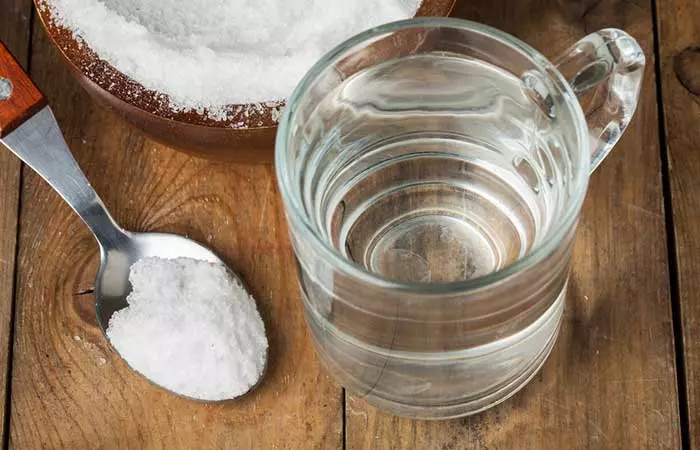
You Will Need
- 1/2 teaspoon of salt
- 1 cup of warm water
What You Have To Do
- Add half a teaspoon of salt to a cup of warm water.
- Mix well and use this solution to gargle.
How Often You Should Do This
You can do this multiple times daily.
Why This Works
Gargling with salt water can help get rid of the phlegm that is stuck between the tonsils and gaps inside your mouth and throat.
This phlegmi Translucent white substance produced from the throat or nose when one catches a cold, or during a sinus infection. usually contains the microbes responsible for tonsillitis. Also, salt has antiseptic properties that can help treat the infection. The warm water used for gargling breaks down the mucus and makes breathing easier (1).
2. Apple Cider Vinegar
You Will Need
- 1 tablespoon of apple cider vinegar
- 1 glass of warm water
- Honey (optional)
What You Have To Do
- Add a tablespoon of apple cider vinegar to a glass of warm water.
- Mix well and add honey for flavor.
- Gargle or consume this solution.
How Often You Should Do This
You can do this 1 to 2 times daily.
Why This Works
Apple cider vinegar (ACV) possesses antibacterial and antiviral properties that can help kill the bacteria that cause tonsillitis (2). It is also anti-inflammatory and can help to reduce the swelling and inflammation of your tonsils (3).
3. Chamomile Tea
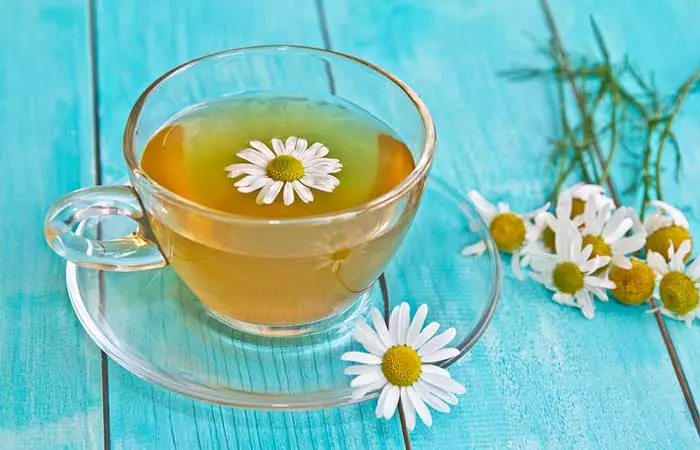
You Will Need
- 1 teaspoon of dried chamomile
- 1 cup of hot water
- Honey
What You Have To Do
- Add a teaspoon of dried chamomile to a cup of hot water.
- Allow it to steep for 5 to 10 minutes.
- Strain and add honey to this concoction.
- Drink the chamomile tea before it turns cold.
How Often You Should Do This
You must do this 2 to 3 times daily.
Why This Works
Chamomile is a medicinal herb with a wide range of benefits. It has anti-inflammatory properties that can help reduce the swelling, inflammation, and pain associated with tonsillitis (4). It also increases the potential of antibiotics, making it a sure-shot way to combat tonsillitis.
4. Bee Propolis
You Will Need
Bee propolis throat spray
What You Have To Do
Spray the bee propolis directly into your throat.
How Often You Should Do This
Do this 1 to 2 times a day.
Why This Works
Bee propolis, also known as bee glue, is a sticky substance that bees use to seal small cracks or gaps in their hive. And surprisingly, this substance is beneficial to humans. Bee propolis has some wonderful antibiotic, antiviral, and anti-inflammatory properties, which make it effective in treating ailments like cough, cold, and tonsillitis (5).
Caution
Some individuals may be allergic to bee propolis. Hence, care should be taken before using it.
5. Onion

You Will Need
- 1 onion
- 1/2 cup of water
- Honey
What You Have To Do
- Blend an onion with half a cup of water.
- Add honey to this and mix well.
- Consume this mixture in small quantities throughout the day.
How Often You Should Do This
Do this once daily.
Why This Works
Onions exhibit natural antibacterial properties that can help in combating the bacteria that cause tonsillitis (6). Additionally, onions are also anti-inflammatory and can help relieve swelling and inflammation of your tonsils (7).
6. Ginger
You Will Need
- 1 inch of ginger
- 1 cup of water
- Honey (optional)
What You Have To Do
- Boil the ginger in a cup of water in a saucepan.
- Simmer for 5 minutes and strain the solution.
- Allow the tea to cool down a bit.
- Add honey and consume this tea daily.
How Often You Should Do This
You can do this 3 or 4 times daily.
Why This Works
Ginger contains a compound called gingerol that has anti-inflammatory and antibacterial properties (8), (9). Fresh ginger is also proven to exhibit antiviral activities, which makes it all the more suitable for curing tonsillitis (10).
7. Fenugreek Seeds
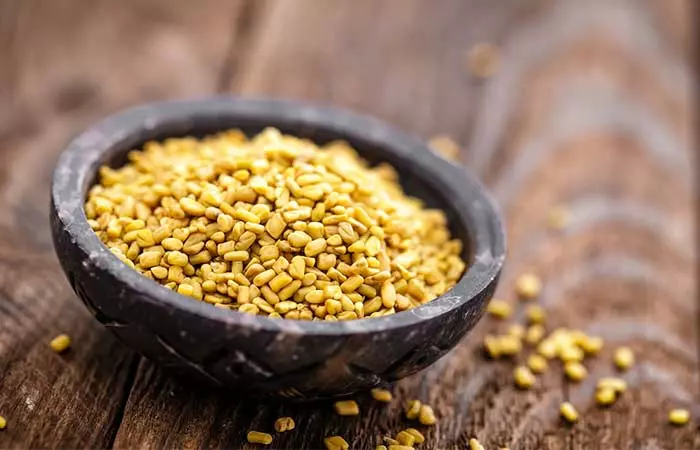
You Will Need
- 3 tablespoons of fenugreek seeds
- 1 L of water
What You Have To Do
- Add the fenugreek seeds to water in a pan and bring it to a boil.
- Simmer for 5 minutes and then allow it to cool a little.
- Use this fenugreek solution to gargle throughout the day.
How Often You Should Do This
Do this several times a day until you run out of the solution.
Why This Works
Fenugreek is an excellent natural remedy for tonsillitis, given its anti-inflammatory, antiviral, and antibacterial properties (11), (12). The antiviral and antibacterial properties of fenugreek can help fight infections while its anti-inflammatory properties can provide relief from swollen and inflamed tonsils. Fenugreek seeds also act as a natural expectoranti A drug that stimulates the secretion of sputum in the air passages, which helps clear mucus from the airway and treat cough. and help break down the phlegm in your throat.
8. Milk
You Will Need
- 1 cup of hot milk
- A dash of pepper and turmeric powder
What You Have To Do
- Add some pepper and turmeric powder to a cup of hot milk.
- Mix well and drink it before your bedtime.
How Often You Should Do This
Do this before bedtime for three nights consecutively.
Why This Works
Milk is a proven remedy against many infections, including tonsillitis. Daily consumption of milk can help soothe your inflamed tonsils and relieve pain. The combination of milk with turmeric and pepper is even more effective against tonsillitis. This is because turmeric (Curcuma longa) and pepper (Piper nigrum) also have anti-inflammatory, antimicrobial, and analgesic properties, which not only help treat tonsillitis but also provide relief from its symptoms (13), (14), (15), (16).
9. Carrot, Cucumber, And Beetroot Juice

You Will Need
- 150 mL of carrot juice
- 50 mL of cucumber juice
- 50 mL of beetroot juice
What You Have To Do
- Mix the three juices in the specified quantities.
- Drink this mixture.
How Often You Should Do This
You must do this once daily.
Why This Works
Vegetables are a rich source of many nutrients that help your body combat infections naturally (17). The vegetable juice mixture of carrots, cucumber, and beetroots is a commonly used remedy for tonsillitis. The vitamins A and C in these vegetables not only help fight inflammation but also enhance the action of antibiotics against tonsillitis (18).
10. Fresh Figs
You Will Need
- 2-3 fresh figs
- Water
What You Have To Do
- Boil a few fresh figs in water.
- Make a paste out of the boiled figs and apply it externally to your throat.
- Leave this on for 10 to 15 minutes and wash it off with water.
- You can also eat some figs on a daily basis.
How Often You Should Do This
Do this 1 to 2 times daily.
Why This Works
Figs are a rich source of phenolic compounds that exhibit anti-inflammatory properties (19). They can help relieve the inflammation and pain associated with tonsillitis, both internally and externally. Figs are also naturally antibacterial and can help relieve infections that cause tonsillitis (20).
11. Alum
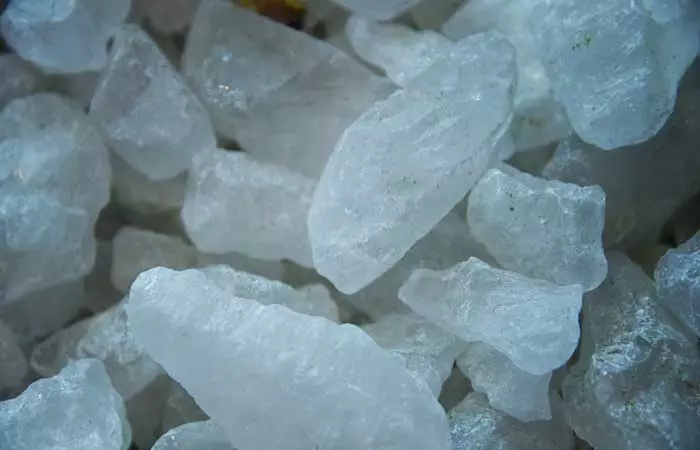
You Will Need
- 1/4 teaspoon of alum powder
- 1 glass of hot water
What You Have To Do
- Add alum powder to a glass of hot water.
- Mix well and use this solution to gargle.
- Alternatively, you can also apply a paste made of alum and water externally to your throat.
How Often You Should Do This
You must do this at least 2 to 3 times daily.
Why This Works
Alum, also known as aluminum potassium sulfate, possesses some exceptional anti-inflammatory and bactericidal properties that can help soothe the pain and infection accompanying tonsillitis (21), (22).
Caution
Alum should not be ingested and must only be used for gargling or topical application.
12. Mint Tea
You Will Need
- A handful of peppermint leaves
- A cup of hot water
- Honey
What You Have To Do
- Crush the peppermint leaves and boil them in water in a saucepan.
- Simmer for 5 minutes and strain.
- Allow it to cool a little and add some honey to it.
- Drink this tea on a daily basis.
How Often You Should Do This
You can drink this tea 3 to 4 times daily.
Why This Works
Peppermint tea is one of the best treatments for upper respiratory tract infections like cold and flu (23). Peppermint has antibacterial, antiviral, analgesic, and anti-inflammatory properties, which can prove quite beneficial in the treatment of tonsillitis and its symptoms (24).
13. Mustard Powder
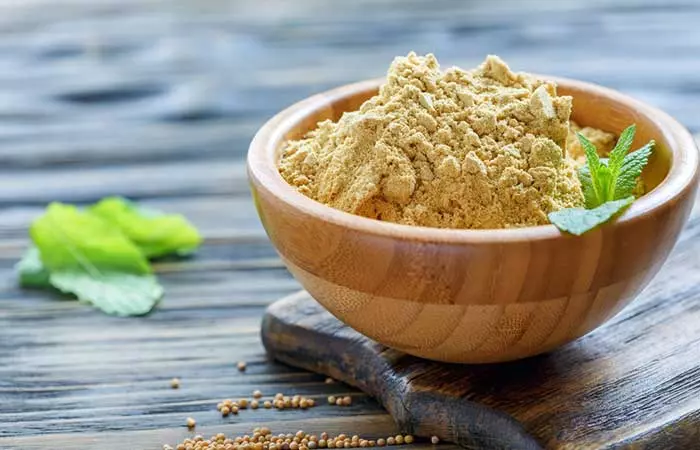
You Will Need
- 1 teaspoon of mustard powder
- 1 cup of hot water
What You Have To Do
- Add a teaspoon of mustard powder to a glass of hot water and mix well.
- Gargle with this mixture.
How Often You Should Do This
Do this at least thrice daily for effective relief from tonsillitis.
Why This Works
Mustard seeds are a rich source of minerals like magnesium and selenium that exhibit powerful anti-inflammatory properties (25). They also contain curcumin, a compound found in turmeric. The presence of this compound imparts antimicrobial and analgesic properties to mustard seeds and proves to be quite helpful in dealing with tonsils and its symptoms (26), (27).
14. Soups And Broths
Tonsillitis can also be a side effect of a sore throat or cold. Consuming hot soups and broths made from veggies and chicken can be quite helpful in soothing and healing a sore throat. The various nutrients in them help you recover faster and also improve your immunity (28). Hot soups can also provide immediate relief from swollen and inflamed tonsils by reducing the pain and swelling associated with the condition. You can also add herbs like garlic and ginger to your broth for added benefits.
15. Wood Violets

You Will Need
- Wood violet flowers
- 1 glass of milk
- Honey
What You Have To Do
- Add some wood violet flowers to a glass of milk.
- Bring this to a boil in a saucepan.
- Allow it to cool a bit and add honey.
- Mix well and consume the milk before it turns cold.
- Alternatively, you can also apply a mixture of wood violets, milk, and margarine directly to the inflamed tonsils.
How Often You Should Do This
You must do this once daily.
Why This Works
Wood violet is a violet flower that exhibits some phenomenal anti-inflammatory properties (29). The anti-inflammatory and soothing nature of this flower can help relieve the swelling and pain that usually accompany tonsillitis.
16. Lemons
You Will Need
- 1/2 lemon
- A pinch of salt
- A pinch of pepper
What You Have To Do
- Take a lemon and cut it in half.
- Sprinkle some salt and pepper on one half and
- heat it a little using tongs.
- Suck out all the juice of the lemon.
How Often You Should Do This
Do this 1 to 2 times daily.
Why This Works
Lemon is a rich source of vitamin C and various phytochemicals that make it a potent herbal remedy. The mucilage from lemon is proved to have anti-inflammatory properties and can help relieve pain and inflammation (30). Lemons also exhibit bactericidal effects that can be especially helpful against bacterial tonsillitis (31).
17. Epsom Salt
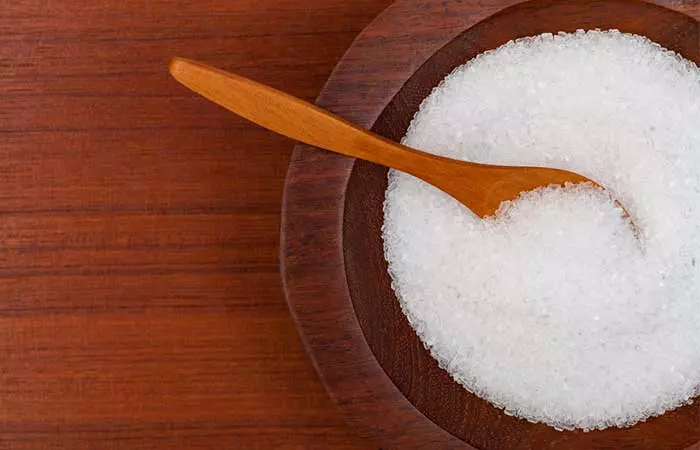
You Will Need
- 1 cup of Epsom salt
- Water
What You Have To Do
- Add a cup of Epsom salt to your bathwater.
- Soak and relax in it for 15 to 20 minutes.
How Often You Should Do This
Do this at least thrice a week.
Why This Works
Epsom salt, also known as magnesium sulfate, is widely used for its soothing and anti-inflammatory properties (32). The high magnesium content of this salt can help relieve the pain and inflammation of tonsils (33).
18. Oregano
You Will Need
- 1 teaspoon of dried oregano
- 1 cup of water
- Honey (optional)
What You Have To Do
- Add a teaspoon of dried oregano to a cup of water and bring this to a boil in a saucepan.
- Simmer for 5 minutes and strain.
- Allow the oregano tea to cool down a little. Add some honey if required.
- Drink this tea on a daily basis.
How Often You Should Do This
Do this thrice daily.
Why This Works
Oregano is a medicinal herb that is proven to exhibit powerful antibacterial properties against a number of bacterial strains (34). It also possesses antiviral properties, owing to the presence of a compound called carvacrol in it (35). These properties make oregano an effective herbal medicine for treating both viral and bacterial tonsillitis. Oregano is also anti-inflammatory and can help relieve the symptoms of tonsillitis such as a sore throat and swollen tonsils (36).
19. Barley
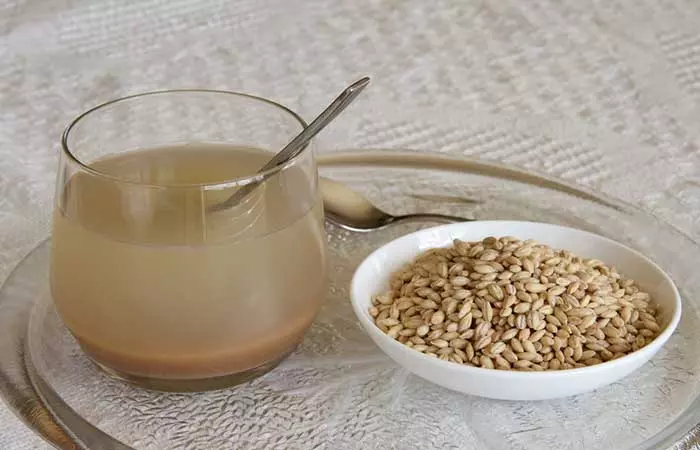
You Will Need
- 1-2 cups of barley
- 1-2 L of water
What You Have To Do
- Add a cup of barley to a liter of water.
- Bring it to a boil and simmer for 5-10 minutes in a saucepan.
- Allow it to cool.
- Drink this water at regular intervals.
- You can also apply the paste made of barley and water externally to your throat.
How Often You Should Do This
Do this 1 to 2 times daily.
Why This Works
Barley is a rich source of vitamins and minerals and is also one of the best natural antioxidants. It is often used to relieve inflammation and can soothe the inflamed tonsils (37). Barley grains are also antimicrobial and can be used to treat infections that cause tonsillitis (38).
20. Water Hyacinth
You Will Need
- 1-2 twigs of water hyacinth
- 2-3 teaspoons of mustard oil
What You Have To Do
- Burn the water hyacinth twigs to ashes.
- Mix the ashes with some mustard oil to form a fine paste.
- Apply this paste topically to your throat.
How Often You Should Do This
You can do this 1 to 2 times daily.
Why This Works
Water hyacinth is an aquatic plant that exhibits amazing anti-inflammatory and antibacterial properties (39). When applied topically, the ashes of this plant can significantly reduce the swelling and pain of your tonsils (40).
21. Coconut Oil
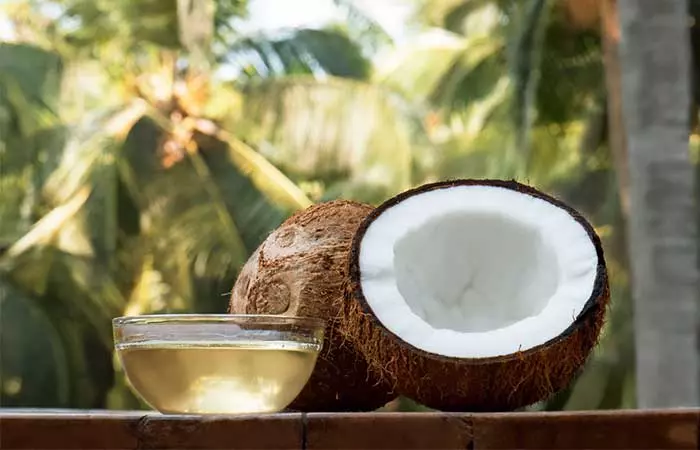
You Will Need
1 tablespoon of coconut oil
What You Have To Do
- Gargle a tablespoon of coconut oil for a minute and spit it out. Do not swallow.
- Alternatively, you can also do oil pulling with coconut oil to get relief from tonsillitis.
How Often You Should Do This
You can do this twice daily.
Why This Works
Coconut oil is a rich source of lauric acid. This compound exhibits antibacterial properties that fight the bacteria causing tonsillitis (41). Coconut oil is also anti-inflammatory and can help in reducing the swelling and inflammation of the tonsils (42). It is also a natural decongestanti A drug or medicine that is prescribed by a doctor to treat nasal congestion, a condition in which the nasal passage is swollen. and can help clear phlegm that may have developed as a result of prior infection.
22. Pineapple Juice
You Will Need
- 1/4 pineapple
- 1 cup of water
What You Have To Do
- Blend the pineapple with a cup of water.
- Drink the juice.
How Often You Should Do This
Drink pineapple juice once daily.
Why This Works
Pineapples are a rich source of vitamin C and an enzyme called bromelain. While vitamin C enhances the efficiency of antibiotics, bromelain exhibits powerful anti-inflammatory properties, which relieves the symptoms of tonsillitis and speeds up recovery (43), (44). Also, pineapples are antibacterial and can combat infections that have the potential to worsen the condition (45).
23. Yogurt
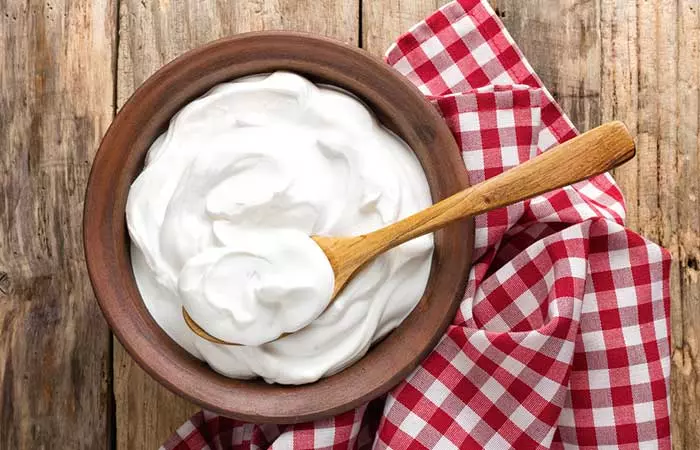
You Will Need
1 cup of plain yogurt
What You Have To Do
Have a cup of plain yogurt.
How Often You Should Do This
You can do this once daily.
Why This Works
Yogurt is a natural probiotic that can help treat tonsillitis. It not only has a soothing and anti-inflammatory effect on your swollen and inflamed tonsils but also boosts your immunity (46), (47). It can also treat and prevent infections (like the common cold) that have the potential to cause tonsillitis (48).
The remedies mentioned above can help you treat tonsillitis. But how long do tonsils take to heal? Find out in the next section.
How Long Does Tonsilitis Take To Heal?
The healing time for tonsilitis (inflammation of the tonsils) depends on the severity of the condition and the individual’s overall health. The symptoms of viral tonsillitis usually improve within 3 to 4 days. However, it might take up to 2 weeks for the throat to fully heal. Bacterial tonsillitis starts to improve within 24 to 48 hours after starting antibiotics, with the infection resolving within 7 to 10 days (49). However, it might take a few weeks for the tonsils to return to their normal size. Hence, follow the home remedies and your doctor’s advice to ensure a proper recovery.
Along with the remedies mentioned above, you must also follow a few tips to prevent the recurrence of tonsillitis. They are as listed below.
Preventive Tips
- Increase your intake of soups and broths
- Consume more of zinc and probiotic-rich foods like yogurt
- Use a humidifieri A device that keeps indoor air moist and hence helps treat dry sinuses, chapped lips and prevent several respiratory disorders. in your room to keep the air moist. Moist air prevents your throat from drying further. Steam inhalation is another way to protect your throat from dryness.
- Maintain a distance from those suffering from tonsillitis or a sore throat
- Wash your hands at regular intervals
- Keep a hand sanitizer handy
- Always cover your mouth and nose while coughing or sneezing
- Quit smoking
- Practise yoga poses like Rabbit Pose, Lion Pose, and Corpse Pose to get relief from the symptoms of tonsillitis
- Keep yourself hydrated and take plenty of rest.
If tonsillitis is a recurring problem for you, you can consider getting your tonsils removed surgically. The procedure is known as tonsillectomyi A surgical procedure in which the two palatine tonsils are removed from the back of the throat in case of tonsillitis. . Tonsillectomy may also be performed on individuals who snore a lot. However, there are a few side effects that may surface with the removal of your tonsils, and they are discussed below.
Side Effects Of Tonsillectomy
The side effects of tonsillectomy vary in their severity and may also cause life-threatening complications in some cases. The most common side effects include:
- Throat pain
- Nausea
- Difficulty in swallowing
- Bad breath
- Earaches
- Fatigue
- Slight fever
- Nose bleeding
While most cases of tonsillitis heal within a week with proper care, some symptoms may signal the need for medical attention. Scroll down to know more.
When To Seek Medical Help
You must get medical help right away if you have a high fever, severe throat discomfort, or trouble breathing. These signs may relate to a more serious illness or indicate tonsillitis complications that need prompt treatment. Early detection and treatment of these warning signs can help avoid complications and provide the right care.
Infographic: Types Of Tonsillitis And Treatment Methods
Tonsillitis, or the inflammation of the tonsils, may present differently in different individuals. It may get resolved with simple home remedies in some people, while others may require surgery. Check out the infographic to know more about the different types of tonsilitis and their treatment methods.
Some thing wrong with infographic shortcode. please verify shortcode syntax
Tonsillitis, or the swelling of the lymph nodes at the back of the throat, is a contagious medical condition that can be caused due to the common cold or strep. Yellow or white spots on swollen tonsils, fever, chills, sore throat, and difficulty swallowing are some of the most common symptoms of tonsilitis. A throat examination or a swab test is used to diagnose tonsilitis. In mild cases, home remedies for tonsils that are inflamed and infected may prove to be effective. You can apply natural remedies like salt water gargle, apple cider vinegar, milk, fenugreek seeds, herbal teas, Epsom salt, and pineapple juice for relief from the symptoms.
Frequently Asked Questions
What are the first signs of tonsillitis?
Some of the first signs of tonsillitis are red, swollen tonsils, trouble swallowing, and a scratchy throat. Additional early signs may include a scratchy voice, fever, and infection-indicating white or yellow patches on the tonsils.
Can tonsillitis be treated without antibiotics?
Yes, mild cases of tonsillitis can often be managed without the use of medicines, especially when a viral infection is the culprit. However, if the tonsillitis is caused by a bacterial infection, such as strep throat, antibiotics are usually necessary to prevent complications.
How can I prevent tonsillitis from recurring?
Keeping your hands clean and avoiding close contact with people who have respiratory infections will help you avoid getting tonsillitis again. Another way to lower your risk is to maintain a healthy lifestyle, use a humidifier at home, and stay hydrated.
What to do for white spots on tonsils?
The white spots on the tonsils are a result of a bacterial, viral, or fungal infections. Gargling with salt water, drinking warm soups, and using a room humidifier are some of the options that can help you get rid of them.
How common is tonsillitis in babies?
Tonsillitis is a common infection among kids and infants alike. In fact, most kids have bouts of tonsillitis throughout their childhood. Bacterial tonsillitis often affects children aged 5 to 15 years, while viral tonsillitis is more common in the younger lot.
How long does tonsillitis last?
Tonsillitis usually lasts from 4 to 7 days. However, in some cases, it may recur every now and then. This type of tonsillitis is termed as chronic tonsillitis.
Which is worse – tonsillitis or strep throat?
Tonsillitis and strep throat have similar effects on the affected individual and are equally disturbing. In some cases, tonsillitis may also develop from a strep throat.
Can you get strep throat without tonsils?
Yes, you can get a strep throat even after the removal of your tonsils. In certain cases, individuals who got their tonsils removed contracted a sore throat later. Hence, it is quite evident that tonsils have nothing to do with a strep throat infection.
What drinks to avoid with tonsillitis?
Avoid drinking sodas, caffeine, and alcohol as it may cause dehydration and aggravate your sore throat further.
Is ice cream good for tonsillitis?
No, avoid eating ice cream during tonsillitis as it can aggravate the inflammation and infection further. Instead, one should consume warm food that will help soothe the throat and reduce pain.
Illustration: Home Remedies For Tonsils | Causes And Prevention Tips

Image: Dall·E/StyleCraze Design Team
Tonsillitis can be painful and uncomfortable. Check out the following video to learn about its symptoms, treatments, and some home remedies to help relieve the pain.
Personal Experience: Source
StyleCraze's articles are interwoven with authentic personal narratives that provide depth and resonance to our content. Below are the sources of the personal accounts referenced in this article.
i. Sickety-sickhttps://jane.wordpress.com/2009/06/12/sickety-sick/
References
Articles on StyleCraze are backed by verified information from peer-reviewed and academic research papers, reputed organizations, research institutions, and medical associations to ensure accuracy and relevance. Read our editorial policy to learn more.
- Prevention of upper respiratory tract infections by gargling: a randomized trial
https://pubmed.ncbi.nlm.nih.gov/16242593/ - Vinegar: Medicinal Uses and Antiglycemic Effect
https://www.ncbi.nlm.nih.gov/pmc/articles/PMC1785201/ - Antimicrobial activity of apple cider vinegar against Escherichia coli
Staphylococcus aureus and Candida albicans; downregulating cytokine and microbial protein - Chamomile: A herbal medicine of the past with bright future
https://www.ncbi.nlm.nih.gov/pmc/articles/PMC2995283/ - Propolis: A Wonder Bees Product and Its Pharmacological Potentials
https://www.ncbi.nlm.nih.gov/pmc/articles/PMC3872021/ - Anti-bacterial action of onion (Allium cepa L.) extracts against oral pathogenic bacteria
https://pubmed.ncbi.nlm.nih.gov/9354029/ - Anti-inflammatory effects of onions: inhibition of chemotaxis of human polymorphonuclear leukocytes by thiosulfinates and cepaenes
https://pubmed.ncbi.nlm.nih.gov/2246074/ - Antibacterial activity of [10]-gingerol and [12]-gingerol isolated from ginger rhizome against periodontal bacteria
https://pubmed.ncbi.nlm.nih.gov/18814211/ - Anti-Oxidative and Anti-Inflammatory Effects of Ginger in Health and Physical Activity: Review of Current Evidence
https://www.ncbi.nlm.nih.gov/pmc/articles/PMC3665023/ - Fresh ginger (Zingiber officinale) has anti-viral activity against human respiratory syncytial virus in human respiratory tract cell lines
https://pubmed.ncbi.nlm.nih.gov/23123794/ - Fenugreek a multipurpose crop: Potentialities and improvements
https://www.ncbi.nlm.nih.gov/pmc/articles/PMC4894452/ - Investigating Therapeutic Potential of Trigonella foenum-graecum L. as Our Defense Mechanism against Several Human Diseases
https://www.ncbi.nlm.nih.gov/pmc/articles/PMC4739449/ - A Review on Antibacterial
Antiviral - Analgesic and anti-inflammatory activities of Piper nigrum L
https://pubmed.ncbi.nlm.nih.gov/25312168/ - Anti-inflammatory properties of curcumin
a major constituent of Curcuma longa: a review of preclinical and clinical research - Antibacterial mechanism and activities of black pepper chloroform extract
https://www.ncbi.nlm.nih.gov/pmc/articles/PMC4648884/ - Health Benefits of Fruits and Vegetables1
https://www.ncbi.nlm.nih.gov/pmc/articles/PMC3649719/ - Oral vitamin C supplements to prevent and treat acute upper respiratory tract infections
https://www.ncbi.nlm.nih.gov/pmc/articles/PMC6424584/ - Ficus carica L. (Moraceae): Phytochemistry
Traditional Uses and Biological Activities - In vitro antimicrobial activity of four Ficus carica latex fractions against resistant human pathogens (antimicrobial activity of Ficus carica latex)
https://pubmed.ncbi.nlm.nih.gov/20067867/ - In vitro antimicrobial activity of potash alum
https://pubmed.ncbi.nlm.nih.gov/8783521/ - An Experimental Study of the Anti-oxidant and the Anti-inflammatory Effects of Alum and Burnt Alum
https://www.ncbi.nlm.nih.gov/pmc/articles/PMC4331937/ - Treatment of Upper Respiratory Tract Infections in Primary Care: A Randomized Study Using Aromatic Herbs
https://www.ncbi.nlm.nih.gov/pmc/articles/PMC2967840/ - A review of the bioactivity and potential health benefits of peppermint tea (Mentha piperita L.)
https://pubmed.ncbi.nlm.nih.gov/16767798/ - Brassicaceae Mustards: Phytochemical Constituents, Pharmacological Effects, and Mechanisms of Action against Human Disease
https://pmc.ncbi.nlm.nih.gov/articles/PMC11354652/ - Therapeutic Roles of Curcumin: Lessons Learned from Clinical Trials
https://www.ncbi.nlm.nih.gov/pmc/articles/PMC3535097/ - Antimicrobial Effects of Mustard Flour and Acetic Acid against Escherichia coli O157:H7
Listeria monocytogenes - Complementary And Alternative Medicine Practitioner’s Management Of Acute Respiratory Tract Infections In Children – A Qualitative Descriptive Study
https://www.ncbi.nlm.nih.gov/pmc/articles/PMC6875505/ - Efficacy and safety of add-on Viola odorata L. in the treatment of COVID-19: A randomized double-blind controlled trial
https://www.ncbi.nlm.nih.gov/pmc/articles/PMC9757886/ - Anti-inflammatory effect of lemon mucilage: in vivo and in vitro studies
https://pubmed.ncbi.nlm.nih.gov/16435583/ - Bactericidal activity of lemon juice and lemon derivatives against Vibrio cholerae
https://pubmed.ncbi.nlm.nih.gov/11041258/ - Bathing in a magnesium-rich Dead Sea salt solution improves skin barrier function
enhances skin hydration - The use of Epsom salts
historically considered - Antiviral efficacy and mechanisms of action of oregano essential oil and its primary component carvacrol against murine norovirus
https://pubmed.ncbi.nlm.nih.gov/24779581/ - [The antibacterial activity of oregano essential oil (Origanum heracleoticum L.) against clinical strains of Escherichia coli and Pseudomonas aeruginosa]
https://pubmed.ncbi.nlm.nih.gov/23484421/ - Anti-inflammatory and anti-ulcer activities of carvacrol
a monoterpene present in the essential oil of oregano - Methanol extract of the aerial parts of barley (Hordeum vulgare) suppresses lipopolysaccharide-induced inflammatory responses in vitro and in vivo
https://pubmed.ncbi.nlm.nih.gov/23746221/ - Characterization and antimicrobial activity of barley grain(Hordeumvulgare)extract
https://www.researchgate.net/publication/259560048_Characterization_and_antimicrobial_activity_of_barley_grain_Hordeum_vulgare_extract - Anti-Inflammatory Activity Of The Various Solvent ExtractsOf Eichhornia crassipes (Mart.) Solms
https://sphinxsai.com/2013/pharmAJ13/pdf/PT=46(641-644)AJ13.pdf - Phytochemical Analysis
Antifungal - Comparison of antibacterial efficacy of coconut oil and chlorhexidine on Streptococcus mutans: An in vivo study
https://www.ncbi.nlm.nih.gov/pmc/articles/PMC5109859/ - Anti-inflammatory
analgesic - Properties and Therapeutic Application of Bromelain: A Review
https://www.ncbi.nlm.nih.gov/pmc/articles/PMC3529416/ - Dietary supplementation with fresh pineapple juice decreases inflammation and colonic neoplasia in IL-10-deficient mice with colitis
https://pubmed.ncbi.nlm.nih.gov/20848493/ - In vitro Evaluation of Antibacterial Efficacy of Pineapple Extract (Bromelain) on Periodontal Pathogens
https://www.ncbi.nlm.nih.gov/pmc/articles/PMC4229839/ - Anti-inflammatory effects of probiotic yogurt in inflammatory bowel disease patients
https://www.ncbi.nlm.nih.gov/pmc/articles/PMC2219330/ - Health Benefits of Probiotics: A Review
https://www.ncbi.nlm.nih.gov/pmc/articles/PMC4045285/ - The Effect of Probiotics on Prevention of Common Cold: A Meta-Analysis of Randomized Controlled Trial Studies
https://www.ncbi.nlm.nih.gov/pmc/articles/PMC3560336/ - Tonsillitis: Overview
https://www.ncbi.nlm.nih.gov/books/NBK401249/
Read full bio of Dr. Thomas Connelly
Read full bio of Shaheen Naser
Read full bio of Arshiya Syeda
Read full bio of Dipti Sharma

























Community Experiences
Join the conversation and become a part of our empowering community! Share your stories, experiences, and insights to connect with other beauty, lifestyle, and health enthusiasts.